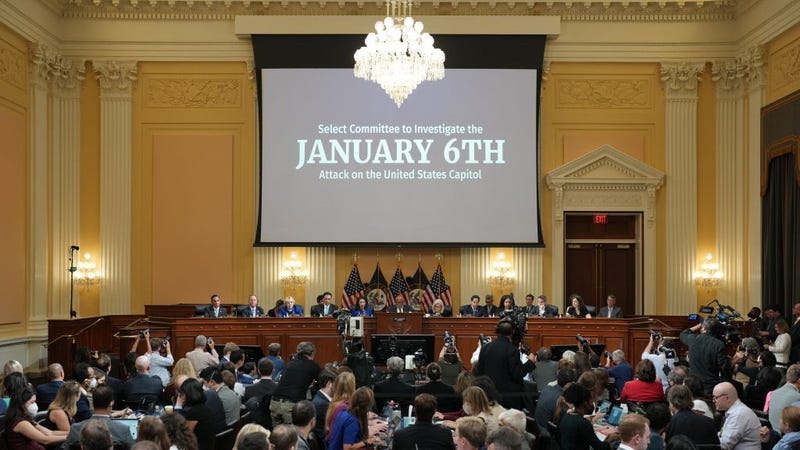
The House select committee investigating the Jan. 6, 2021 attack on the U.S. Capitol began its seventh hearing on Tuesday with a focus on President Donald Trump and his allies' alleged roles in assembling the extremist groups that stormed the Capitol.
Chairman Rep. Bennie Thompson (D-Miss.) gave his opening statement, and explained how Trump "summoned a mob to Washington, D.C."
"You can't try to achieve you desired outcome through force or harassment or intimidation," Thompson said. "Any real leader who sees their supporters going down that path, approaching that line, has a responsibility to say, 'Stop, we gave it our best, we can up short, we can try again next time.' Because we settle our differences at the ballot box.
"Today, the committee will explain how as a part of his last ditch effort to overturn the election and block the transfer of power, Donald Trump summoned a mob to Washington, D.C. and ultimately spurred that mob to wage a violent attack on our democracy."
Vice chairwoman Rep. Liz Cheney (R-Wyo.) then went on to explain how the strategy for defending Trump has changed since the hearings started weeks ago.
"Today's hearing is our seventh, we have covered significant ground over the past several weeks," Cheney said. "And we have also seen a change in how witnesses and lawyers in the Trump orbit approach this committee. Initially, their strategy in some cases appeared to be to deny and delay.
"Today, there appears to be a general recognition that the committee has established key facts, including that virtually everyone close to President Trump... all told him the 2020 election was not stolen. This appears to have changed the strategy for defending Donald Trump. Now the argument seems to be that President Trump was manipulated by others outside of the administration. That he was persuaded to ignore his closest advisers, and that he was incapable of telling right from wrong...
"The strategy is to blame people his advisers called, 'the crazies,' for what Donald Trump did. This of course is nonsense. President Trump is a 76-year-old man, he is not an impressionable child. Just like everyone else in our country, he is responsible for his on actions and choices. As our investigation has shown, Donald Trump had access to more detailed and specific information showing that the election was not actually stolen than almost any other American. And he was told this over and over again."
The committee focused on a tweet from Trump on Dec. 19, 2020, that called people to come to Washington, D.C. on Jan. 6, 2021.
"Peter Navarro releases 36-page report alleging election fraud 'more than sufficient' to swing victory to Trump https://t.co/D8KrMHnFdK. A great report by Peter. Statistically impossible to have lost the 2020 Election. Big protest in D.C. on January 6th. Be there, will be wild!" Trump tweeted.
Rep. Jamie Raskin (D-Md.) said that the tweet came after a meeting on Dec. 18, and Trump decided to go ahead and take matters in his own hands. The committee then showed video of Pat Cipollone, former White House counsel, who was interviewed last week and said that Trump should have conceded after Dec. 14.
After the committee took a break for recess, Raskin pointed out a relationship between Roger Stone, a top Trump adviser, and extremist groups like the Oath Keepers. The committee then showed a Trump draft tweet that was going to tell people to march to the Capitol from the riot.
Video of the interview with Cipollone showed him praising former Vice President Mike Pence for not backing down to the pressure from Trump to overturn the electoral college results.
Rep. Stephanie Murphy (D-Fla.) then discussed Trump's speech on Jan. 6, in which the former president adlibbed multiple parts of the speech. Murphy said that Trump's speech "was built on a foundation of lies" and "his supporters believed him and headed towards the Capitol."
Chairman Thompson then introduced Jason Van Tatenhove, a former spokesman of the Oath Keepers, and rioter Stephen Ayres, who entered the Capitol illegally on Jan. 6.
"In my opinion, the Oath Keepers are a very dangerous organization," Van Tatenhove said in testimony.
He went on to say that he broke away from the group after hearing some members say "the Holocaust was not real." Van Tatenhove added that he should have left the group earlier than that.
Ayres, who plead guilty to entering the Capitol, was asked by Thompson why he decided to come to Washington, D.C. on Jan. 6.
"I felt like I needed to be out here," Ayres said after learning about the "Stop the Seal" rally on social media through Trump and others.
He told Cheney that at the time, he believed the election was stolen. Ayres said he has removed social media from his life following the riots, and has done his own political research, adding that he no longer believes the election was stolen.
Ayres then told Murphy that there was "hope" the election was going to be overturned and believed that Trump was going to be there with people marching. He later told Raskin that he and others decided to leave when Trump tweeted out to go home. Ayres added that since being charged for his role in the Jan. 6 attacks, his life has been completely changed, including losing his job.
"American carnage, that's Donald Trump's true legacy," Raskin said. "His desire to overthrow the people's election and seize the presidency, interrupt the count of electoral college votes for the first time in American history... Our hearing next week will be a profound moment of reckoning for America."


